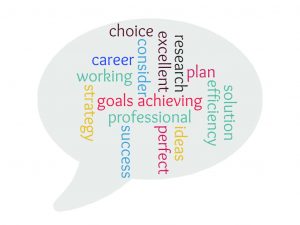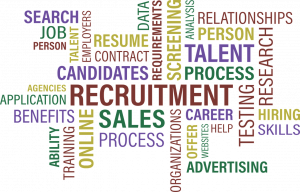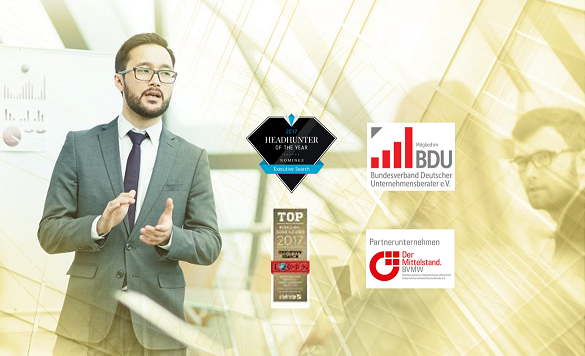FIRST IMPRESSION
People tend to look for confirmation of their first impression.
Therefore, feel free to form a first opinion and write it down.
Then try to look specifically for details that do not confirm your first feeling.
LAST THINGS FIRST
After a brief introduction, once again outline the scope of the job and the opportunity it presents.
Then let the candidate ask his or her questions.
Having questions asked at the beginning offers some advantages to the interviewer.
The questions asked here and the candidate’s level of preparation give initial indications, of interest and commitment.
In addition, the cognitive abilities are well tested with such a, rather unusual, interview start.
Then start the questioning process!
Whether you take your notes by hand or on a laptop (tablet) is a matter of taste.
Personally, I think that technical equipment is sometimes a psychological barrier and prefer fountain pen & paper.
START AND END DATES
This question is important because resumes are often not accurate and discrepancies come to light. I’ve seen candidates list only annual dates, turning a 6-week interlude into a two-year career move!
Even if the speed of changing positions is much higher today, I do not rate positions of less than two years!
two years!
The reason is simple!
It takes time to settle into one’s new environment, to understand the processes of the new company, to develop and implement one’s own concepts, and then to assess the results and possibly make corrections.
Two years is the lower limit. Shorter guest appearances have little significance.
Was someone good or just lucky? I can’t evaluate that.
Since I want to minimize risks in the selection process, I largely ignore short guest appearances.
WHY DID YOU CHOOSE YOUR CURRENT EMPLOYER?
This question gives you an indication of what the decision-making process of candidates looks like and what your motivating factors are.
WHAT IS YOUR CORE RESPONSIBILITY IN THIS POSITION?
The answer to this question clarifies why the candidate was chosen and what goals they were expected to achieve.
WHAT WERE THE GOALS TO BE ACHIEVED?
I look for candidates who have your key data ready and are also interested in communicating your performance.
Having the most important data always in focus speaks for bite and competence.
WHAT WAS THE SITUATION AT THE TIME OF YOUR START?
It is interesting to know if the candidate had to deal with a turnaround or if they came into a booming company.
Questions about team size, budget, turnover give a picture of the situation at the start.
HOW IS THE POSITION ORGANIZATIONALLY INTEGRATED?
It is important to understand exactly where the position was located.
Titles often lead to misinterpretation.
So ask about the structure, superiors and team.
THE CRUCIAL QUESTION OF “HOW”!
The crucial question of “HOW” is often not asked by interviewers. It is wonderful that good results have been achieved, but we need to know “HOW”.
This is where the wheat is separated from the chaff!
- Was it luck and coincidence or was it due to the quality of the candidate
- Was it a grandiose lone wolf or was a team led to success?
- Was there a plan and a strategy or not?
I am in no way giving the candidates here the feeling that I don’t believe you or doubt anything. I am trying to understand, quite simply, “How” they did, “What” they did.
If you keep asking “how” and really drill down, the story gradually unravels and becomes clear!
BECAUSE THE POINT IS SO IMPORTANT, AN EXAMPLE:
Evaluate salesperson A and salesperson B. Both were ahead at the end of the year.
Salesperson A had a super customer in his district, which was a big part of his success. In fact, his predecessor also won this customer for the company. Lucky.
Salesperson B has systematically filled his pipeline and continuously tracked the development of his leads. His success stands on stable ground.
This gives him the opportunity to grow dynamically in the long term. His close rate has been exceptional. Who would you hire?
WHAT WAS YOUR BIGGEST MISTAKE IN THIS POSITION?
When I ask this question, I look for a certain kind of humility, emotional intelligence and, of course, a learning effect.
Does the candidate realize what they should have done differently.
HOW WOULD YOU DESCRIBE THE LEADERSHIP STYLE OF YOUR SUPERVISOR?
I try to use this question to find out to what extent the candidate fits my leadership style.
- Is the straightforward, hands-on variety preferred?
- Are details and micromanagement important to the candidate?
- What is the expectation of a supervisor?
- Are the characters so contrary that they would drive each other crazy from day one?
WHAT DID YOU LIKE MOST AND LEAST ABOUT YOUR JOB?
This answer tells us the extent to which the candidate will like or dislike the task at hand.
We see what people have high interest in, what excites them and what they tend to dislike.
For example, if the position to be filled has a high travel component and we sense that travel is not a preference we should definitely take that into account in our subsequent decision.
HOW WAS THE COMPENSATION STRUCTURED?
We have usually already asked this question on the phone, but now we are asking it about the respective positions. The point is to see the trend over the years.
I don’t expect people to have every number ready, but I want to understand the trend.
Also, the breakdown of fixed and variable, and other details like company car and retirement plan.
Sometimes you can also read out how willing candidates are to take risks.
WHY DO YOU WANT TO TAKE A NEW PATH?
With this kind of questioning, I first assume that it is the candidate’s decision, although that is not always the case.
Was someone dismissed, was there difficulty, or did someone really fail?
Even if someone was laid off, it doesn’t necessarily affect me.
Even great employees have been in companies where they just didn’t fit.
WHERE DID YOU LIKE THE ENVIRONMENT AND COMPANY CULTURE BEST?
This is simply a matter of matching whether the environment and company culture is similar to ours.
WHICH VALUES AND CHARACTERISTICS ARE PARTICULARLY IMPORTANT TO YOU?
Make sure to distinguish between values and characteristics and focus on a maximum of 3 aspects per category to get a clear picture.
Again, ask them WHY.
Finally, a tip on the
PROCESS
- Ask the same questions for each item
Why? – Asking identical questions helps to identify patterns
- The result of this interview leads to a score on a scorecard previously agreed upon by all decision makers afterwards
- Allow between 60 and 90 minutes for an interview
Results have comparatively little to do with the goals we set, but almost everything to do with the structure and system we use.
Goals are about the results you want to achieve. Systems map the process that leads to those results.
Remember this phrase well and follow the process, then you will also select the right candidate.
Once the right candidate is selected and hired, the next challenge is on the horizon.
How do I integrate new employees professionally and how does this work “remotely”, as is currently often necessary.
Click here for my comprehensive onboarding checklist
Partner of the QRC Group Personnel Consulting
Phone: +49 (0) 177 / 834 0879
E-mail: georg.hesel@qrc-group.com






